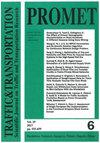基于城市地铁网络的快递路线选择与配送成本研究
IF 1.1
4区 工程技术
Q4 TRANSPORTATION SCIENCE & TECHNOLOGY
引用次数: 0
摘要
本文研究基于城市地铁网络的快递路线选择和配送成本问题,简称地铁快递(MeD)。考虑到快递运输的特点和城市地铁网络的复杂性,提出了三种不同时段的配送模式,并建立了以配送总成本最小为目标的严格集成整数线性规划模型。为了有效求解最优问题,改进并设计了一种标准遗传算法。最后,以宁波地铁网络为例,验证了模型和算法的实用性和有效性。结果表明:当快件配送数量为1980件时,三种不同的MeD模式可分别降低40.5%、62.0%和59.0%的运输成本;案例分析的结果将有助于指导快递公司与城市地铁网络合作,并根据所需的快递数量选择相应的配送方式。本文章由计算机程序翻译,如有差异,请以英文原文为准。
Route Selection and Distribution Cost of Express Delivery: An Urban Metro Network Based Study
Route selection and distribution costs of express delivery based on the urban metro network, referred to as metro express delivery (MeD), is addressed in this study. Considering the characteristics of express delivery transportation and the complexity of the urban metro network, three distribution modes of different time periods are proposed and a strict integrated integer linear programming model is developed to minimize total distribution costs. To effectively solve the optimal problem, a standard genetic algorithm was improved and designed. Finally, the Ningbo subway network is used as an example to confirm the practicability and effectiveness of the model and algorithm. The results show that when the distribution number of express delivery packages is 1980, the three different MeD modes can reduce transportation costs by 40.5%, 62.0%, and 59.0%, respectively. The results of the case analysis will help guide express companies to collaborate with the urban metro network and choose the corresponding delivery mode according to the number of express deliveries required.
求助全文
通过发布文献求助,成功后即可免费获取论文全文。
去求助
来源期刊

Promet-Traffic & Transportation
工程技术-运输科技
CiteScore
1.90
自引率
20.00%
发文量
62
审稿时长
3 months
期刊介绍:
This scientific journal publishes scientific papers in the area of technical sciences, field of transport and traffic technology.
The basic guidelines of the journal, which support the mission - promotion of transport science, are: relevancy of published papers and reviewer competency, established identity in the print and publishing profile, as well as other formal and informal details. The journal organisation consists of the Editorial Board, Editors, Reviewer Selection Committee and the Scientific Advisory Committee.
The received papers are subject to peer review in accordance with the recommendations for international scientific journals.
The papers published in the journal are placed in sections which explain their focus in more detail. The sections are: transportation economy, information and communication technology, intelligent transport systems, human-transport interaction, intermodal transport, education in traffic and transport, traffic planning, traffic and environment (ecology), traffic on motorways, traffic in the cities, transport and sustainable development, traffic and space, traffic infrastructure, traffic policy, transport engineering, transport law, safety and security in traffic, transport logistics, transport technology, transport telematics, internal transport, traffic management, science in traffic and transport, traffic engineering, transport in emergency situations, swarm intelligence in transportation engineering.
The Journal also publishes information not subject to review, and classified under the following headings: book and other reviews, symposia, conferences and exhibitions, scientific cooperation, anniversaries, portraits, bibliographies, publisher information, news, etc.
 求助内容:
求助内容: 应助结果提醒方式:
应助结果提醒方式:


